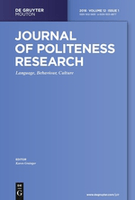
Journal of Politeness Research-Language Behaviour Culture
Scope & Guideline
Decoding Politeness: A Multidisciplinary Approach
Introduction
Aims and Scopes
- Politeness and Impoliteness Theories:
The journal explores theoretical frameworks that define and categorize politeness and impoliteness, examining their implications in different social contexts. - Cross-Cultural Communication:
It investigates how politeness is perceived and enacted in various cultures, highlighting the influence of social norms and cultural practices on language use. - Digital Communication:
The journal addresses the evolving nature of politeness in digital contexts, such as social media and online interactions, exploring how technology impacts language behavior. - Methodological Innovations:
It encourages diverse methodological approaches to politeness research, including experimental studies, ethnography, and corpus-based analyses. - Interpersonal Dynamics:
The journal examines the role of politeness in managing relationships, power dynamics, and identity construction in both face-to-face and mediated communication.
Trending and Emerging
- Interpersonal Pragmatics in Digital Spaces:
Research is increasingly examining how politeness functions in digital communication, particularly in social media contexts, reflecting the impact of technology on language behavior. - Contextualization of Politeness:
There is a growing trend towards contextualizing politeness within specific social, cultural, and situational frameworks, allowing for a more nuanced understanding of language use. - Politeness and Identity Construction:
Emerging studies focus on how politeness strategies are employed in identity formation and negotiation, particularly in multicultural and multilingual settings. - Impoliteness as a Social Tool:
Research on impoliteness is gaining traction, with a focus on its functions in social interaction, including conflict, humor, and social critique. - Cognitive and Semiotic Approaches to Politeness:
An increasing number of studies are adopting cognitive and semiotic perspectives to better understand the mechanisms behind politeness and impoliteness perceptions.
Declining or Waning
- Traditional Politeness Models:
There seems to be a decreasing focus on classical politeness models, such as Brown and Levinson's theory, as researchers explore more nuanced and context-specific frameworks. - Static Cultural Comparisons:
Research that compares politeness across cultures in a static manner is less prevalent, indicating a shift towards dynamic and context-sensitive approaches that consider change over time. - Generalized Online Interaction Studies:
While online communication remains a focus, studies that broadly categorize politeness in digital contexts without specific cultural or situational analysis are becoming less common. - Linguistic Universals of Politeness:
Investigations into universal principles of politeness are waning, with a growing emphasis on localized and context-specific politeness practices. - Descriptive Analyses without Theoretical Frameworks:
There is a decline in purely descriptive studies that lack theoretical grounding, as the journal increasingly values research that contributes to theoretical discussions.
Similar Journals
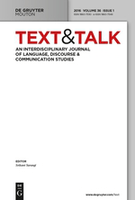
Text & Talk
Bridging Communication, Linguistics, and PhilosophyText & Talk, published by DE GRUYTER MOUTON, is a premier academic journal that serves as a pivotal platform for interdisciplinary scholarship in the fields of Communication, Linguistics, and Philosophy. With its ISSN 1860-7330 and E-ISSN 1860-7349, this Germany-based journal has established a robust presence since its inception in 2005, continuing through 2024. Currently ranked in the Q1 category for both Linguistics and Philosophy, and Q2 in Communication, Text & Talk demonstrates a significant impact within the scholarly community, as reflected in its impressive Scopus rankings across various disciplines. The focus of the journal is to foster rigorous discussions and innovative research on the multifaceted nature of spoken and written discourse, making it indispensable for researchers, professionals, and students eager to explore the interplay between language, context, and communication practices. As an open access title, it enhances visibility and accessibility to cutting-edge research, further solidifying its role as a vital resource in the academic landscape.

Review of Communication Research
Exploring the Dynamics of Modern CommunicationReview of Communication Research is a prestigious open-access journal dedicated to advancing the field of communication studies. Published by REVIEW COMMUNICATION RESEARCH from its base in Madrid, Spain, this journal has established itself as a vital platform for scholarly discourse since its inception. With an impressive impact factor and ranked in the Q1 quartile of communication journals for 2023, it holds a commendable position, placing it within the top 13% of approximately 511 journals in the communication category on Scopus. Since becoming open-access in 2013, the journal has enabled researchers, professionals, and students to access high-quality research without financial barriers, thereby fostering a greater dissemination of knowledge and dialogue within the community. Covering a wide array of topics from communication theory to media studies, the Review of Communication Research continues to contribute significantly to the understanding and evolution of communication in today’s interconnected world. Researchers are encouraged to engage with and submit their findings to this influential journal to further enrich the scholarly landscape.

Communitas
Unlocking New Insights in Socio-Linguistic ResearchCommunitas, published by the University of the Free State, is an esteemed open-access journal that has been a gateway for innovative research and discourse in the fields of communication, linguistics, and language since its inception in 2017. With an ISSN of 1023-0556 and E-ISSN of 2415-0525, the journal aims to foster scholarly exchange by providing a platform for critical analysis and interdisciplinary collaboration. Although it currently falls into Q4 in Communication and Q3 in Linguistics and Language, *Communitas* has made significant strides in establishing its presence in Scopus rankings—ranking 567 out of 1088 in Arts and Humanities and 397 out of 511 in Communication—and sources for researchers at varying stages of their careers. Addressed to a global readership, the journal invites contributions that enhance understanding and generate new perspectives on socio-linguistic issues and communicative practices, making it a pivotal resource for researchers, academics, and students committed to advancing knowledge in these dynamic fields.
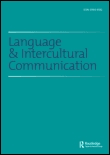
Language and Intercultural Communication
Unpacking the Power of Language in Intercultural SpacesLanguage and Intercultural Communication is a leading peer-reviewed journal published by Routledge Journals, Taylor & Francis Ltd, based in the United Kingdom. With an ISSN of 1470-8477 and an E-ISSN of 1747-759X, this esteemed publication has established itself as a vital resource in the fields of Communication and Linguistics, boasting an impressive Q1 classification in both categories as of 2023. The journal's scope encompasses a broad range of topics related to language and its role in intercultural contexts, making it an essential platform for researchers, professionals, and students alike who wish to contribute to and learn from the latest scholarly discussions. Even without an open-access option, its high impact factor and strong Scopus rankings, which place it in the 87th percentile for Linguistics and Language, affirm its significance in shaping contemporary dialogue. As we move towards 2024, Language and Intercultural Communication continues to foster academic exchanges that challenge, expand, and enrich understanding across diverse linguistic and cultural landscapes, making it a must-read for anyone interested in the intersection of language and culture.
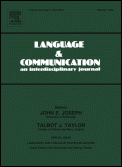
LANGUAGE & COMMUNICATION
Empowering researchers with cutting-edge insights into language.LANGUAGE & COMMUNICATION is a prestigious journal published by PERGAMON-ELSEVIER SCIENCE LTD that serves as an essential resource for researchers and practitioners in the fields of communication, linguistics, and psychology. With a focus on interdisciplinary approaches, this journal has maintained a strong impact, as evidenced by its high rankings—Q1 status in communication and linguistics, and notable categories in experimental and cognitive psychology, as highlighted by the 2023 Scopus rankings. Established in 1981, LANGUAGE & COMMUNICATION combines rigorous empirical research with practical applications, making it a critical forum for advancing understanding in language use and communication theory. While currently not an Open Access journal, it offers vital insights to academics and professionals alike, facilitating knowledge dissemination and sparking meaningful dialogue within the community. Its commitment to excellence is further demonstrated by its contributions to key areas of study, positioning it as a vital publication for anyone invested in the exploration of language and human interaction.
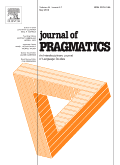
JOURNAL OF PRAGMATICS
Exploring the Dynamics of Language UseJournal of Pragmatics, published by Elsevier, is a premier interdisciplinary journal dedicated to the exploration of language use as a dynamic social phenomenon. Established in 1977 and set to continue through 2024, it serves as a vital resource for researchers across various fields, including Artificial Intelligence, Linguistics, and Language Studies. With an impressive Q1 ranking in Linguistics and Language and a Q2 ranking in Artificial Intelligence, the journal has made significant contributions, supporting a diverse range of theoretical and empirical research. It boasts a solid reputation, evidenced by its strong positions in Scopus rankings—occupying the 91st percentile among the best in the Social Sciences and 92nd in Arts and Humanities. Although it does not currently offer open access, the Journal of Pragmatics remains essential for professionals and scholars seeking to deepen their understanding of pragmatics and its applications in language technology, societal interaction, and cognitive processes. With its international reach and high standards, this journal is a cornerstone for anyone dedicated to advancing knowledge in the fields of language and communication.

Social Influence
Illuminating the Power of Persuasion and NormsSocial Influence is a premier scholarly journal dedicated to advancing the field of social psychology, published by Routledge Journals, Taylor & Francis Ltd. Since its inception in 2007, it has become an essential platform for researchers and practitioners interested in understanding the intricate dynamics of social behavior and the mechanisms of influence within diverse contexts. The journal operates on an Open Access model since 2021, ensuring that its impactful findings are readily accessible to a global audience, fostering collaboration and innovation in the study of social interactions. With an impressive Impact Factor within the Q2 category for 2023, it stands as a vital resource for anyone seeking to explore the intersections of social norms, persuasion tactics, and group dynamics. As part of a converged timeline extending to 2024, it continues to adapt to the ever-evolving landscape of social psychology research, ranking #233 out of 310 in the Scopus classification—reflecting its commitment to quality and relevance. Researchers, professionals, and students alike will find valuable insights and rigorous studies that contribute significantly to the understanding of social influence, making Social Influence an indispensable tool for academic success in this dynamic field.
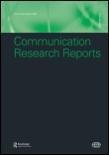
Communication Research Reports
Uncovering Innovations in Communication ResearchCommunication Research Reports, published by Taylor & Francis Ltd, is an esteemed academic journal in the field of communication studies, known for its rigor and scholarly contribution since its inception in 1988. With an impressive Q1 ranking in the Communication category as of 2023, it stands out as a pivotal resource for researchers, professionals, and students alike. This journal focuses on disseminating high-quality empirical research and theoretical discussions that advance understanding in communication practices and dynamics. Although it does not operate under an Open Access model, its consistent publication continues to engage a global audience and supports the ongoing dialogue within the discipline. With its commitment to enhancing scholarly communication, Communication Research Reports is vital for those looking to stay abreast of cutting-edge developments in the social sciences, specifically within communication.
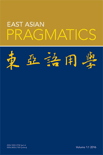
East Asian Pragmatics
Empowering Research in Communication and CultureEast Asian Pragmatics, published by EQUINOX PUBLISHING LTD, serves as a critical platform for interdisciplinary research in the fields of Communication, Cultural Studies, and Linguistics. With an ISSN of 2055-7752 and an E-ISSN of 2055-7760, this journal has established significant relevance, evidenced by its Q2 and Q3 classifications in critical academic categories for 2023. Spanning the years from 2018 to 2024, East Asian Pragmatics aims to advance understanding of pragmatics within the context of East Asia, facilitating scholarly discourse that bridges linguistic insights with cultural phenomena. Its Scopus ranking highlights its growing importance, particularly in cultural studies and linguistics where it ranks in the top half of its categories. Researchers, professionals, and students are encouraged to explore the wealth of knowledge and unique perspectives presented in its articles, contributing to the vibrant tapestry of East Asian linguistic and cultural studies.
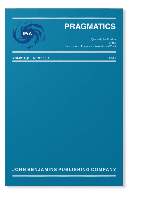
Pragmatics
Pioneering new frontiers in the study of pragmatics.Pragmatics is a premier international journal dedicated to the exploration and development of the field of pragmatics, published by John Benjamins Publishing Co. This esteemed journal, with an ISSN of 1018-2101 and E-ISSN 2406-4238, offers a vital platform for interdisciplinary research in linguistics, philosophy, and social sciences, making significant contributions to scholarly discourse since its convergence in 2005. Recognized for its high-impact research, Pragmatics boasts a prestigious Q1 ranking in both Linguistics and Language and Philosophy as of 2023, with impressive Scopus rankings that place it in the top percentiles of its categories. The journal aims to enhance understanding of communication in diverse contexts and encourages submissions that reflect innovative theoretical perspectives and empirical findings. Although not an open-access journal, it is essential for researchers, professionals, and students seeking to stay at the forefront of pragmatic studies and related disciplines. With its base in Belgium and an address in Amsterdam, Pragmatics continues to influence global conversations in the humanities and social sciences.